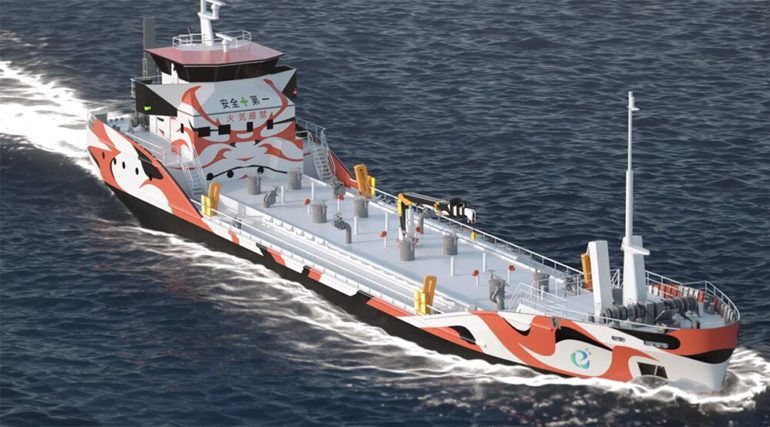Corvus Energy has announced on its website that it has been selected by the Japanese e5 project to supply the battery power for a propulsion system to be designed by Kawasaki Heavy Industries for a soon-to-be deployed shoreline tanker—the first of its kind. The ship itself will be built and run by Asahi Tanker Co., Ltd. of Tokyo, Japan and will be called, at least initially, the e5 tanker. It has a launch date of sometime next year and will represent the first all-electric tanker to be used for commercial purposes. The same group plans to launch a follow-up ship two years later.
Tankers come in all sizes due to their different roles—shoreline tankers are smaller than the giant tankers that cross the oceans. They are used to carry cargo, generally oil or gas, to different ports in the same country, or to another country that is nearby. The new e5 tanker will, ironically, be used to carry diesel fuel to ships in and around Tokyo harbor.
The e5 will be 62 meters in length and will weigh approximately 499 tons. Plans call for twin 1,740-kWh Orca ESS lithium-ion batteries to provide the power for the ship. The batteries are meant to have a capacity of 3.5 megawatt-hours. Dual 300kW azimuth thrusters will push the ship at approximately 10 kph. At this stage, the group is describing the range of the ship as “many hours.”
The group claims that the ship will be much cleaner than those running on oil or diesel fuel and that it will be much quieter as well—for the crew as well as creatures living in the sea. The ships will also be noticeably quieter for those on shore or manning other ships nearby. The group also claims that the electric engines will also produce much less vibration, making trips aboard comfortable for crew. They note also that the ship could also be used in the event of emergencies or natural disasters as a source of power for other machines or ships.
In its announcement, Corvus suggests that the e5 will be the first of many freighter ships to sail emission-free as the near future unfolds. They note that emission restrictions and the plummeting price of lithium-ion technology are making battery-powered ships the most efficient way to go.
Sri Lanka assessing environment damage from oil tanker fire
More information:
corvusenergy.com/corvus-energy … sion-tanker-project/
2021 Science X Network
Citation:
Japanese joint venture to deploy all-electric shoreline tanker (2021, February 16)
retrieved 17 February 2021
from https://techxplore.com/news/2021-02-japanese-joint-venture-deploy-all-electric.html
This document is subject to copyright. Apart from any fair dealing for the purpose of private study or research, no
part may be reproduced without the written permission. The content is provided for information purposes only.



